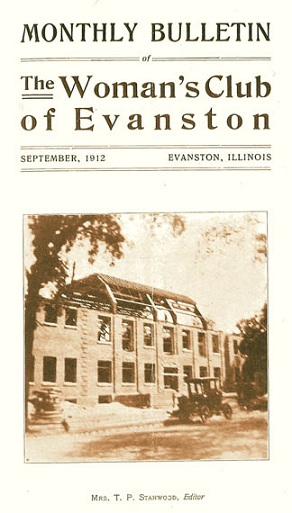In June 1913, Illinois granted women the right to vote. The centennial of this watershed moment inspired us to look at Chicago-area collections that provide insight into the suffrage movement and other aspects of women’s history. During National Archives Month (October), we are featuring posts by guest authors who are familiar with some of these collections. Repository information is at the end of each story.
Erin Hvizdak shares her experiences researching the Women’s Club of Evanston in the first post of our series. Hvizdak is an Adjunct Librarian at the College of Lake County and a Circulation Librarian at Morton College. She has been a volunteer at the Frances Willard Memorial Library and Archives since early 2012.
In search of the Woman’s Club of Evanston
Erin Hvizdak
During the Progressive Era, a thriving “Woman’s Club Movement” was underway. Affiliated with schools, churches, and communities, women -- usually educated and of high economic means -- came together to improve the conditions of society, especially as increasing urbanization and industrialization brought a host of health and safety concerns.
Hundreds of woman’s clubs have come and gone in Chicago, but their records are sparse. When I was first hired to write a history book for the Woman’s Club of Evanston (WCE), founded in 1889, I had no idea how lucky I was to have such an abundance of records available at Northwestern University, including numerous photographs and slides as well as a nearly complete set of the monthly newsletter, first published in 1911. Even more materials are stored at the WCE clubhouse and at the Evanston History Center. The WCE created an archives committee in 1916 to keep its records and collect publicity each year, pasting materials into annual scrapbooks. Rather than being transferred from one member’s home to another, these records resided in the clubhouse, from the time construction was completed in 1913, until most of them were transferred to Northwestern in 1991 and 2009.
The WCE contributed to the start of numerous organizations and systems in Evanston that are taken for granted today. The Club donated more than $3000 to Evanston’s first hospital (1892), provided the first salary of the area’s visiting nurse (1897), paid the first probation worker in Evanston (1902), and paid the city’s first food inspector (1912). These are only a few examples of the activities that WCE and other woman’s clubs undertook to improve their neighborhoods. While the women were no doubt concerned with protecting their own homes and class status, they nonetheless played a leading role in the formation of many social and health services. Many, but not all, have since been taken over and supported by government or corporate entities. Their origins have been forgotten, credit has been given to the other agencies, and the activities of the early woman’s movement are often condensed to a celebration of suffrage. It remains to be seen whether more records of these early woman’s clubs will turn up, but if they do, they will provide a fascinating look into the foundations of Chicago’s (and the nation’s) administration.

IMAGE: WCE Newsletter, September 1912. Courtesy of Northwestern University Archives.
Deering Library, Room 110
1970 Campus Dr.
Evanston, Illinois 60208
The archives is open to the public. Please consult the NU website for hours and access information.
The Dawes House
225 Greenwood Street
Evanston, Illinois 60201
Please consult the History Center website for hours and access information. Construction at The Dawes House this fall may affect access.